Iran's Khamenei Finally Speaks Out On School Gas Attacks
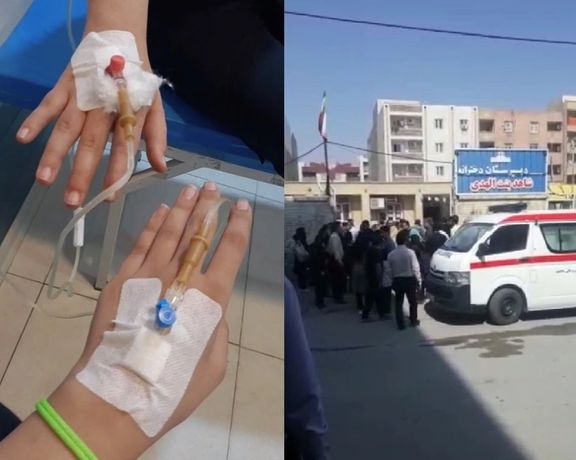
Iran's ruler Ali Khamenei said Monday that poisoning of schoolgirls in recent months is an "unforgivable" crime and denied any government role in the attacks.

Iran's ruler Ali Khamenei said Monday that poisoning of schoolgirls in recent months is an "unforgivable" crime and denied any government role in the attacks.
"Authorities should seriously pursue the issue of students' poisoning. This is an unforgivable crime... the perpetrators of this crime should be severely punished," Ayatollah Ali Khamenei was quoted as saying by state media.
The first incidents of chemical attacks on girls’ schools began in November, but officials first ignored the incidents until they began to spread to several cities in February. Khamenei had so far remained silent while other officials were blaming foreign enemies and regime opponents without showing any proof.
Over a thousand Iranian girls in different schools have suffered "mild poison" attacks since November, according to state media and officials, with some politicians suggesting they could have been targeted by religious groups opposed to girls' education.
However, citizens and critics on social media ask why the government has failed to arrest the perpetrators of such a large and coordinated campaign, while it was efficient in killing and detaining antigovernment protesters.
Other say the hardliner establishment is behind the attacks to take revenge from schoolgirls who joined the Woman, Life, Freedom protests in October and November.
The spreading attacks that started in the holy Shi'ite Muslim city of Qom in central Iran have spread to at least 25 of Iran's 31 provinces, prompting some parents to take their children out of school and hold protests against the establishment.
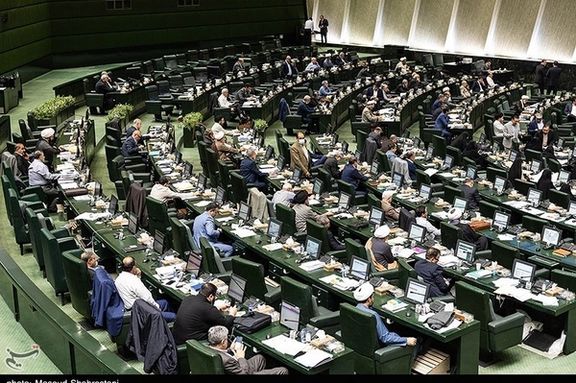
Iran's Parliament sunk into commotion Sunday as a lawmaker tried to stop another one from voicing his constituents’ anger over the so-called ‘chain’ school poisonings.
During a session for examining next year’s budget bill, Seyed Ghani Nazari, the representative of Khalkhal in northwestern Ardabil Province, used his time to speak about his constituents’ anger over the poisoning of schoolgirls in his district.
An ultra-hardliner member of the National Security and Foreign Policy Committee, Javad Karimi Ghodousi, who was standing behind Nazari, kept interrupting him while other lawmakers also shouted to drown his voice. Speaker Mohammad-Bagher Ghalibaf also intervened, asking Nazari to only speak about the budget bill.
“Mr Ghalibaf, what do you expect me to talk about when students were hospitalized in Khalkhal? It’s my duty to demand the government and responsible bodies to investigate. My phone has been ringing since morning and people are asking me to pursue the matter,” Nazari said as other lawmakers joined in the dispute, shouting and gathering around Nazari.
Ghodousi later alleged that those who speak about the poisoning incidents could be “adding fuel to the enemy’s fire”.
The parliament has established a working group to investigate the incidents of mysterious poisonous gas attacks on girls’ schools that have now spread to around 100 cities.
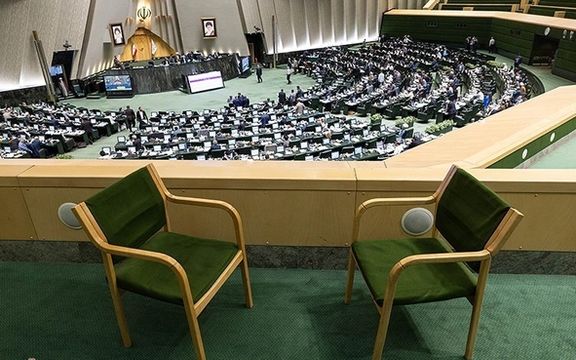
Poisoning of students was reported in at least 80 more schools across the country Sunday.
Hardliners and government officials are increasingly attributing the gas attacks to “students’ pranks” or “enemies of the Islamic Republic”.
Authorities have yet not offered any report on the incidents or on findings based on samples taken from over 1,500 students who have been hospitalized since the first incident took place in the religious city of Qom on November 30.
The ultra-hardliner Kayhan newspaper whose chief editor Hossein Shariatmadari is an appointee of the Supreme Leader Ali Khamenei on Saturday claimed that opposition groups such as the Mujahedin-e Khalq Organization (MEK) have been perpetrating the attacks on behalf of foreign enemies and casting the blame on religious groups in Iran or the government.
“It’s worthy of note that certain western governments and intelligence services have a long history of committing crimes and blaming others for them including the chemical attacks by their Sunni extremist mercenary groups in Syria for which they blamed the Syrian government. The CIA and Mossad have committed many acts of biological terror,” Kayhan wrote.
However, such claims are countered by citizens that how the ‘enemy’ is able to conduct such widespread attacks if the government has control over the country.
The IRGC-linked Fars News Agency on Sunday claimed that experts believe pranks by teenage students or “mass phobia” are the most likely explanations for the mysterious poisonings.
Given the highly synchronized nature of the attacks, many in Iran accuse the government of having a direct role in the poisoning of schoolgirls, as revenge for their rejection of the hijab and their active role in the Woman, Life, Freedom protests in the past few months. Even if some fundamentalist groups are behind the chemical attacks the government stands accused of covering up their crime.
“People from inside the system must be collaborating with the perpetrators,” wrote Abbas Akhoundi, a roads and urban development minister in Hassan Rouhani’s government, in Shargh newspaper Saturday.
Some medical experts such as Dr. Mohammadreza Hashemian, an official of Masih Daneshvari Hospital in Tehran where many of the victims have been treated, have pointed out that the gases suspected of being used by the attackers seem to be composed of various chemicals that are not accessible to ordinary people.
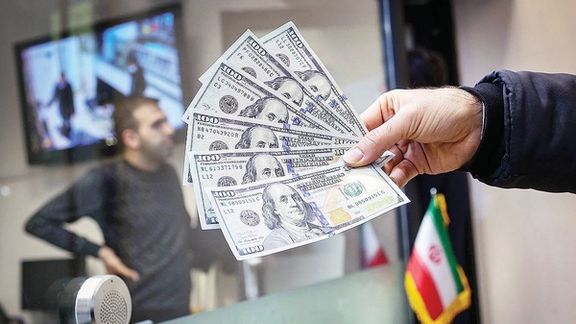
Iran’s national currency, rial, bounced back Sunday, regaining some of its recently lost ground following a visit by the UN nuclear watchdog, IAEA head Rafael Grossi.
Last Sunday the rial had dropped to 600.000 against the US dollar, but exactly a week later it stood at a little over 500,000 on March 4, probably over hopes that the Islamic Republic would opt for closer cooperation with the International Atomic Energy Agency, and what some in Iran hope would lead to a resumption of talks with the United States.
Despite the rebound, the rial is still down 100 percent since President Ebrahim Raisi took office in August 2021, as Iran suffers from both lack of oil export income and a crisis in its domestic economy. Although the rial might rise some more but it is a fundamentally weak currency as long as Iran has not reached a new nuclear agreement with the West and sanctions remain in place.
Kamran Soltanizadeh, the head of the Iranian Exchangers Association, also mentioned another factor Sunday. He said that the Central Bank of Iran's decision on Saturday to allow exchange offices to buy foreign currencies gained from exports of petrochemicals and minerals helped the rise of the rial against the dollar. He predicted that the rial would further rebound in the following days over the decision.
Rials long decline since early 2018 is to a large extent the result of US sanctions the former US President Donald Trump imposed when he withdrew from the 2015 nuclear deal with Iran. At that time the US dollar was at 35,000 rials and steadily began to rise, ultimately reaching 600,000 last week.
Since November, the US has tightened regulations on dollar transfers by Iraqi banks, from where Iran was smuggling some currency helping it to keep the rial relatively stable. This action further weakened the Iranian currency.
Iraq, whose official trade exchange with Iran amounts to approximately $14 billion a year, has struggled to pay Tehran for its imports of natural gas and electricity due to the US sanctions. Apparently, it decided to pay Iran in Iraqi dinars, which is not a fungible currency except in Iraq itself, and Iran began buying US dollars there and repatriating it. This caused a dollar shortage in Iraq since December and the dinar lost some value.
Ali Shariati, a member of the Iran-Iraq Chamber of Commerce and a businessman, said that when the Islamic Republic is unable to receive its money in dollars, it would be a win to be able to receive the funds in dinars. The Central Bank of Iraq is in control of payments in dinar, but according to the recent negotiations the US is sensitive about its dollars, so Iraq may have paid the Islamic Republic in dinars to avoid strict regulatory sensitivities, he added. He said that the Islamic Republic is not in a situation to choose currencies as one of the reasons behind the jump in the dollar rate was the interruption of the inflow of foreign currency from Iraq.
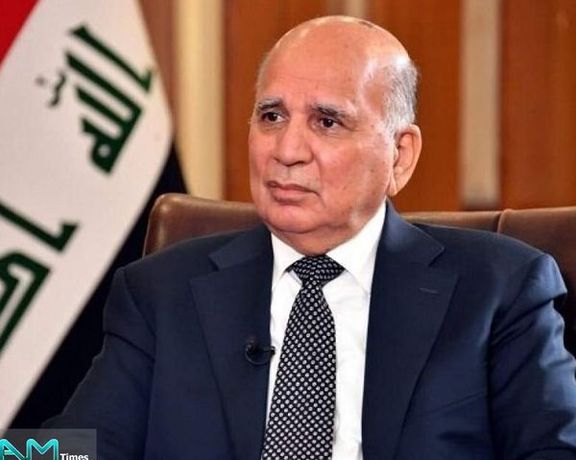
In February, Deputy Prime Minister and Foreign Minister of Iraq, Fuad Hussein accompanied by Central Bank of Iraq Governor Ali al-Allaq met with both the State Department and with Treasury to discuss a host of economic issues, but an urgent issue was how to prevent Iran from using Iraq’s banking ties with the United States to launder US dollars and circumvent Washington’s sanctions.
Iran claims its exports to Iraq are on the rise approaching $10 billion despite pressure by the United States on Baghdad to stop money smuggling from the Arab country to Iran.
Local media also said that what began to help the rial was intervention by the Central Bank of Iran when it injected $700 million in UAE dirhams last Sunday, February 26, into the Tehran’s foreign currency market and the rial began to rise from its all-time low of 600,000 against the US dollar.
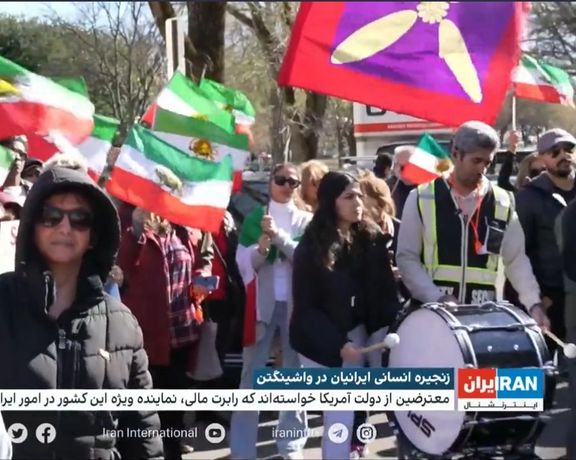
A group of Iranian expatriates have held a protest outside the office of US Special Envoy on Iran, Robert Malley, in Washington DC to call for his dismissal.
Tens of Iranians gathered for the rally on Saturday in front of Malley’s office calling on the Biden administration for his dismissal.
Malley has been under fire for his soft approach in dealing with the Iranian regime in the past months and is one of those blamed for the breakdown in nuclear talks last year.
Back in October, he stated in a tweet that Iranians were protesting to have the Islamic Republic “respect their human rights and dignity,” a statement Iranians refuted, claiming he undermined the wider message that Iranians want a new, democratic government and not respect from an oppressive regime.
Iranians feel Malley is out of touch with the needs of Iranians and do not trust his hand in taking the nuclear talks to the next level. "He underestimates the levels the regime will go to," said one protester who asked not to be named. "He has no idea what living under this oppression is like."
Protesters plan to hold weekly events outside the State Department to demand Malley's dismissal.
Another participant told Iran International that such events show the helplessness Iranians in the diaspora feel, unable to express their anger with the regime and its brutal crackdown on innocent civilians exercising their right to protest.
After his tweet in October, New-York based activist Masih Alinejad, demanded Malley resign. “By continually misrepresenting Iranian’s rejection of Islamic Republic, he is hurting the US administration standing among the people of Iran.,” Alinejad said.
In response to the criticism, Malley told Iran International at the time: “Neither I nor the US government can claim to speak for protesters. Only they can do that, and I’d never intend to imply otherwise.”
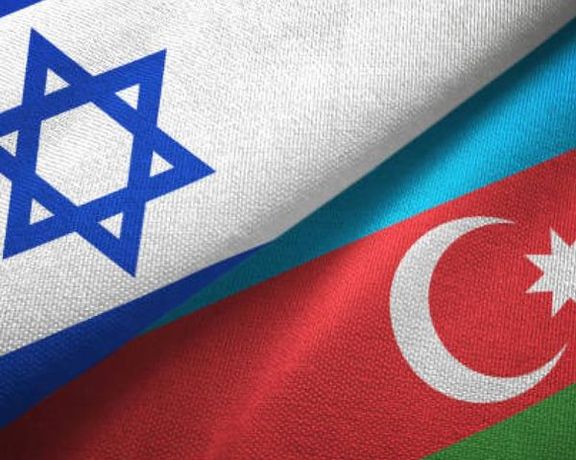
Azerbaijan is to allow Israel to use its airfields in case of a possible attack against Iran's nuclear facilities as part of their military cooperation media say.
The revelations were published in the left-wing Israeli daily, Haaretz, which found that over the past seven years, 92 cargo flights flown by Azerbaijani Silk Way Airlines have landed at the Ovda air base, the only airfield in Israel through which explosives may be flown into and out of the country.
According to the report, during times of conflict between the Republic of Azerbaijan and Armenia, the number of flights between Israel and Azerbaijan also increases.
In return for military support, Azerbaijan has allowed Israel's secret service, Mossad, to set up a forward branch to monitor what is happening in Iran," according to Haaretz. Baku has even prepared a dedicated airfield intended to aid Israel in case it decides to attack Iranian nuclear sites, according to the investigation.
Azerbaijan and Israel have been increasingly public in their growing ties. While Israel has had an embassy in Azerbaijan since the 1990s, just in January, Azerbaijan formally appointed its first ambassador to the Jewish state.
Iran continued to dominate headlines in Israel over the weekend in the wake of the visit of the chief of the International Atomic Energy Agency, Rafael Grossi. In Tehran, Grossi claimed that an Israeli attack on the Iranian nuclear facilities is against the law.
It was met with a harsh response from Netanyahu: "Rafael Grossi is a worthy gentleman who said something unworthy. Against which law? Is Iran, which openly calls for our destruction, permitted to defend the destructive weapons that would slaughter us? Are we permitted to defend ourselves? It is clear that we are and it is clear that we will do so."
He added, "Nothing will deter us from defending our country and preventing our enemies from eliminating the state of the Jews."
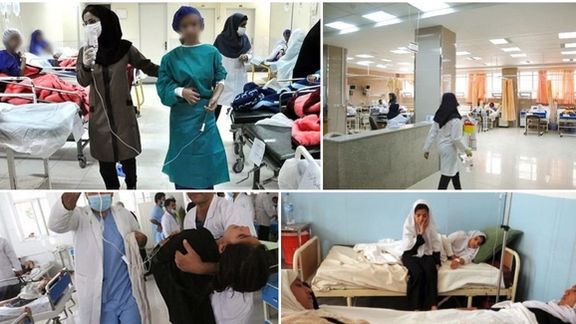
About 80 more schools were targeted by chemical attacks on Sunday with dozens of girls hospitalized, as the international community demands answers to the mysterious poisonings.
The poisonings, targeting girls' schools since November, have been ramped up this week with hundreds more girls falling sick across Iran.
Social media videos surfaced on Sunday show that students were poisoned in many cities, including Fouladshahr and some other cities in Esfahan (Isfahan) province, Karaj and Fardis in Alborz province, Tabriz, Yazd, Hamedan, Shiraz, Ramhormoz and Mahshahr in Khuzestan province, Qazvin, Gonbad-e Kavus in Golestan, and the capital Tehran. Only In the city of Yazd, at least eight schools were attacked on Sunday.
On Saturday alone, schools in 33 cities were targeted by the same gas that has already affected around 1,500 students in recent weeks.
The scale of the intentional poisoning of female students -- which started in the religious city of Qom and spread further throughout the country and reached schools in small towns and villages -- has stepped up in recent weeks, becoming a daily occurrence.
State media is trying to downplay the seriousness of the incidents, with some officials such as former MP Jamileh Kadivar calling the attacks “mass hysteria.”
Many, such as Dr. Mohammadreza Hashemian, a doctor in the special care department of Masih Daneshvari Hospital, fear the poisonings are being led by regime authorities. He said that the gases used to poison the students are a combination of different chemicals, which it is "not possible for ordinary people" to access.
With women and girls having been at the forefront of protests, burning headscarves and cutting their hair in defiance of the regime, it is believed that the attacks are a coordinated effort to deter the young students from supporting ongoing unrest, triggered by the death of the young woman, Mahsa Amini. Her death in morality police custody after being arrested for the inappropriate use of her headscarf, has triggered national protest since September.
The patterns of the school attacks are similar to chemical attacks committed by radical Islamists in Chechnya and the Taliban in Afghanistan.
The regime’s Health Minister Bahram Eynollahi admitted that the girls have suffered "mild poison" attacks, while Interior Minister Abdolreza Rahmani Fazli said on Saturday, "In field studies, suspicious samples have been found, which are being investigated... to identify the causes of the students' illness, and the results will be published as soon as possible."
Outraged by the Islamic Republic’s inaction and reluctance to identify and arrest those behind the attacks, many parents, students and other activists have held demonstrations outside the buildings of the Education Ministry across the country, but security forces attacked the gatherings and arrested some of the parents and students.
In a gathering of parents outside an Education Ministry building in Tehran, people chanted "Basij, Guards, you are our Daesh," likening the Revolutionary Guards and other security forces to the Islamic State group. Comparing the Islamic Republic with the Taliban, protesters also chanted "Death to the Taliban, whether in Iran or Afghanistan".
Also on Sunday, a group of about 420 Iranian political and civil activists issued a statement to media, describing the poisoning of students as a "criminal act" that has caused "national concern".
On Friday, the United Nations human rights office in Geneva called for a transparent investigation into the attacks. Countries including the US and Germany have also voiced concern.
Nobel Peace Prize winner and human rights lawyer Shirin Ebadi says there is no doubt about the role of the regime in the mass poisoning attacks. Iran's exiled queen Farah Pahlavi also condemned the attacks, saying the Islamic Republic is showing parts of "its impure nature to the world."
Exiled prince Reza Pahlavi also tweeted, “Iranian girls are being poisoned at schools across Iran. I urge the international community to bring pressure on the regime and demand access for investigations on-the-ground in Iran. Khamenei and his regime must be stopped.”
Canada-based activist Hamed Esmaeilion, whose daughter and wife were killed by the IRGC, also decried the school attacks, calling on the international community and democratic governments not to remain silent. “Will you finally stand with the people of Iran and expel the Islamic Republic Ambassadors?” he asked.